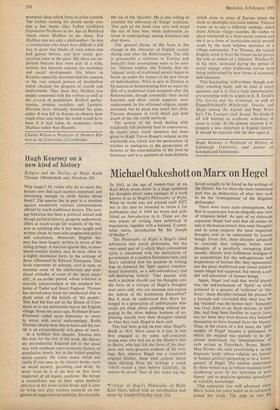Hugh Kearney on a new kind of history
Why magic? Or rather why do so many his- torians now find such matters important and interesting enough to write books about them? The answer lies in part in a reaction against excessively rational interpretations offered by much traditional history. The aver- age historian has been a political animal and though political history, properly understood, offers as much scope for students of the biz- arre as anything else it has been taught and written about by men who emphasised policy and calculation. Moreover, English his- tory has been largely written in terms of the ruling groups. A reaction against this, in nine- teenth-century studies, may be seen, often in a highly emotional form, in the writings of those influenced by Edward Thompson. This book represents an attempt, cool in tone, to examine some of the intellectual and emo- tional attitudes of some of the 'great majo- rity', at an earlier period, whose existence is scarcely acknowledged in the standard his- tories of Tudor and Stuart England. Thomas has moved away from the intellectual elite to study some of the beliefs of 'the people'. This had led him not to the House of Com- mons or to the universities but to the English village. Some ten years ago, Professor Evans- 'Pritchard called upon historians to come to terms with social anthropology. Keith 'Thomas clearly took this to heart and the res- ult is an extraordinarily rich piece of work. In a brilliant first chapter, Thomas sets the tone for the rest of the book. He discus- ses pre-industrial England not in the usual way with emphasis upon economic factors or , population trends, but in the widest possible social context. He raises issues which are 'rarely if ever seen in the history books, such 'as social anxiety, gambling, and drink. In some ways he is at his best on that most neglected of all topics, medicine. He brings a sympathetic eye to bear upon medical practice at the lower social levels and is able (to bring into play modern research on the /power of suggestion in medicine, for example
the use of the 'placebo'. He is also willing to consider the relevance of 'fringe' medicine. This part of the book may very well stand the test of time best, when fashionable in- terest in anthropology among historians has died down.
The general theme of the book is the change in the character of English society during and after the Reformation. The title is presumably a reference to Tawney and basically their assumptions seem to be simi- lar. Thomas implies, like Tawney, that the 'organic' unity of traditional society began to break up under the impact of the new forces of individualism. What is new in Thomas is his success in demonstrating how so many be- liefs of a traditional kind remained after the Reformation, though eventually their social function and their social supports were undermined. In the reformed religion, magic remained but its place was much less clear. Thomas discusses in vivid detail just how much of the old world survived.
The section of the book dealing with witchcraft will probably lead to controversy. In recent years much attention has been given to Hugh Trevor-Roper's volume on the witchcraft era, which saw the persecution of witches as analogous to the persecution of heretics or the extermination of the Jews in Germany and as a question of mass hysteria which arose in areas of Europe where the clash of ideologies was most intense. Thomas wants us to use a different analogy, taken from African village societies. He wishes to place witchcraft in a local social context and see it as a form of inarticulate social protest made by the most helpless members of a village community. For Thomas, the typical English witch is from the lowest social group, the wife or widow of a labourer. Witchcraft, in his view, increased during the period of social change when traditional norms were being undermined by new forms of economic individualism.
This fascinating, well-written, though pos- sibly overlong book, will be read in many quarters, and is in fact a truly interdisciplin- ary enterprise with its origins in E. R. Dodd's The Greeks and the Irrational, as well as Evans-Pritchard's Witchcraft, Oracles and Magic among the Azande and Peter Wors- ley's The Trumpet shall Sound. No doubt it all will become an academic orthodoxy in years to come. At the present moment it re- presents a new departure in English history. )t should be enjoyed with the dew upon it.
Hugh Kearney is Professor of History at Edinburgh University, and author of Scholars and Gentlemen.


































 Previous page
Previous page